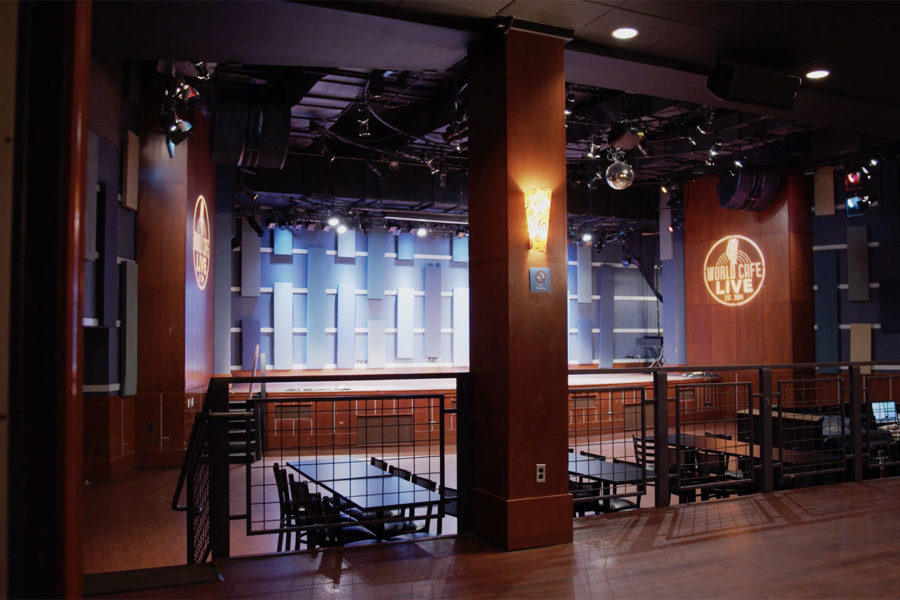
An empty World Cafe Live awaits the return of live music
Hal Real is aptly named, especially since he operates a music venue at a time when people don’t want to gather gathering in large, close-contact crowds and enjoy a concert.
To him, anybody who is expecting to stage a show anytime soon in a room full of people is, well, unrealistic. Real, whose World Café Live has been dark and empty since mid-March—along with every other music spot in the area—isn’t wishing or hoping. He is working hard to exist until the moment when society is ready to reengage with live shows and spend a couple of hours in close proximity to others without worrying that a throat clear can lead to big trouble.
“We are hunkering down for the long haul,” Real says. “We think that before life can resume with anything close to normalcy there has to be a vaccine, and people have to be comfortable going out again.
“The idea of operating at 25-to-50-percent capacity is bizarre. Even at 100 percent, we operate on small margins.”
Because WCL became a non-profit concern last December 1, it has been able to use federal funding, grant money and contributions from donors to survive the past few months. But the inability to stage, or even reliably schedule, shows has put it in a difficult position, one which is shared by other venues in the region. At first, they merely postponed artist appearances, figuring that the fall would be a safer time to hold shows. Now, they can’t even book artists for the beginning of 2021, thanks to the uncertainty that prevails about large-scale gatherings. Even clubs that hold a few hundred people can’t put together a slate, because many of them are standing-only rooms, which lead to especially tight gatherings.
The result is a resounding quiet throughout the Philadelphia music scene, which over the past several years has blossomed to include a variety of new venues, many of them independent and therefore not able to rely on corporate reserves or foreign investment to survive. Most have become as creative as possible to produce some revenue and keep alive a future of live performances. However, another year of this could prove deadly to their businesses.
“It has been really tough,” says James Reed, co-owner of Johnny Brenda’s in Fishtown. “We have two full-time people who do nothing but book shows. They’re working as hard as ever rescheduling and rescheduling shows. They’re doing triage and just trying to help us survive.”
That survival depends largely on a set of circumstances no one can predict, and thanks to government mandates, are largely out of the venues’ control. Though things are much different than they were in March and April, when the quarantine was at its peak, and the idea of speaking with someone not in your own family—even at a distance—was considered dangerous, trying to imagine a large group of people in a confined space remains difficult. So, venue operators have used federal loan programs and even GoFundMe pages to provide some compensation for employees and are getting as creative as possible to provide some music to patrons.
One of the problems with live music is that it is best experienced, well, live. Watching streams, listening to recordings and viewing archival footage provide just a portion of the true effect. Real likens the experience of virtual concerts to “looking at pictures of food.” The music loses its impact, yes, but so much of a performance is the ability for people to experience it as a community.
“You can’t mimic the ability to attend shows in person,” says Christianna LaBuz, programming director at City Winery at 10th and Filbert Streets in Philadelphia. “You hear the music live, but you also feel it and see it with your own eyes. You experience food and maybe discover a new beer.
“There’s no replacement for that.”
LaBuz and others have done plenty to keep at least some revenue trickling in. City Winery is filling wine orders, offering live-stream shows and arranged for artists to provide Mother’s Day and Father’s Day greetings to fans for modest fees. Johnny Brenda’s has made some money with takeout food and beer, and Ardmore Music Hall, on the Main Line, has opened its library of video and audio recordings for patrons to access.
“You have to get creative,” LaBuz says. “Fortunately, that’s our business, to come up with these options.”
Even though the Ardmore Music Hall website still lists some concerts that had been scheduled for 2020, co-owner Chris Perella is not naïve. He would love to see the venue, which has a capacity of 600, filled with fans, but he understands his situation clearly. While the Main Line spot has been offering livestreams and archived recordings and planning for some pay-per-view events, nothing short of a full return will be able to generate the revenues necessary to keep AMH, along with its smaller (200 capacity) sister venue in Wayne, 118 North, open and alive.
Since the prospects of full tours and packed rooms seem limited for the rest of 2020, Perella is looking to the future. He believes we won’t see full-fledged national, or even regional, tours for quite a while and that the return of live music in the area will be limited to bands who are within reasonable drives of venues.
“We need to plan as if 2021 will be normal,” Perella says. “We need that. The music industry is full of scrappy and hustling people.”
Perella and his fellow operators are battling uncertainty, but they are also doing what they can to explore various protocols for whatever shape their eventual re-openings take. For instance, LaBuz reports that City Winery will not stage concerts with a room (capacity 312) that is 25 percent full. “Does that make sense?” she asks. “It doesn’t.” But 50 percent is another story. Since City Winery’s space is completely reserved, accommodations can be made for distancing patrons. Each ticketholder could have a specific time when he or she is to enter. The venue could require people to wear masks and to agree to have their temperatures taken. Food orders could be placed ahead of time. There might be timed bathroom breaks, which could be challenging if someone’s bladder decides it’s really time to go. If someone doesn’t want to comply, City Winery would have to offer refunds.
“We don’t have a choice in this,” she says. “We will likely be in the middle of the pack in terms of when we open. We’re not in any rush.”
Predicting the future is difficult during normal times, but trying to define how the music world will look after the pandemic recedes is practically impossible. James Herman of Kung Fu Necktie in Fishtown predicts that “the scene is going to suffer for at least two years” and expects to see “smaller, intimate shows” for normal headliners and that in the short run, venues will have fewer live shows and more DJ events. Although Kung Fu Necktie’s website lists several shows for the summer—some of which are already postponed—it’s unlikely any of them will take place, and Herman reports that the site is booking acts for October but not “doing any crazy guarantees.” In other words, nothing is certain. Reed reports that Johnny Brenda’s has “handshake agreements” with bands for future shows but has nothing in cement.
There is even tremendous uncertainty among the big boys. Live Nation and AEG, the sworn enemies of small music spots because of their efforts to control the marketplace, have lost considerable money because of an abandoned summer shed concert series and further cancellations at smaller sites they control, like The Fillmore and Franklin Music Hall in Philadelphia. In an effort to stanch the bleeding, Live Nation sold a 5.7% stake to Saudi Arabia in April, which provided a necessary infusion of $500 million in cash.
There isn’t much doubt the concert giants will rebound, once the big acts hit the road again. A bigger issue is what happens down the food chain. Perella has spent much of the shutdown trying to let his creative energy flow without driving his fellow teammates crazy. He has been part of many conversations with his production team about how to improve AMH’s future offerings, and while that hasn’t led to a complete reset, it has produced some good ideas. “We may stage two shows in one night or have artist residencies or multiple bookings,” Perella says.
The quarantine has also produced a greater sense of camaraderie among those in the music business. Yes, they will compete to attract bands, but they also realize their situations are tenuous and that they have a lot of common. That goes for those who stage the shows and those who play them. “There is a great sense of empathy and cooperation,” Perella says. “We have been having a dialogue with other people in the industry.” One concrete way that has manifested itself is through the National Independent Venue Association (NIVA), which began in February and has about 1,600 members in all 50 states who are working to promote and save smaller concert halls. Real is a founding member and is passionate about making sure people understand the value live performances provide for the economy and the public at large. In late April, NIVA sent a letter to Congress lobbying for more federal aid.
The advocacy helps, but in many ways, there is nothing to do but wait for a time when people will feel safe watching live music together again.
“We’re going to have to be fluid,” Perella says. “We’re used to working four-to-eight months out. It’s going to be a different world. If our entire business proposition is going to be based on a government mandate that can be changed in a week’s time, we’re going to have to live week-to-week.”
And keep things very Real.

